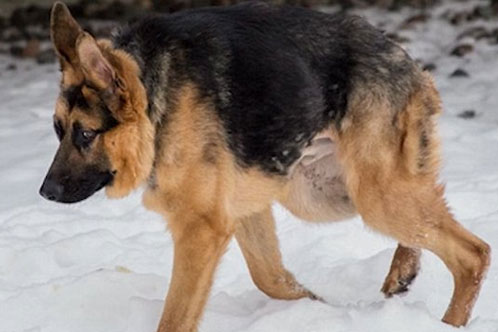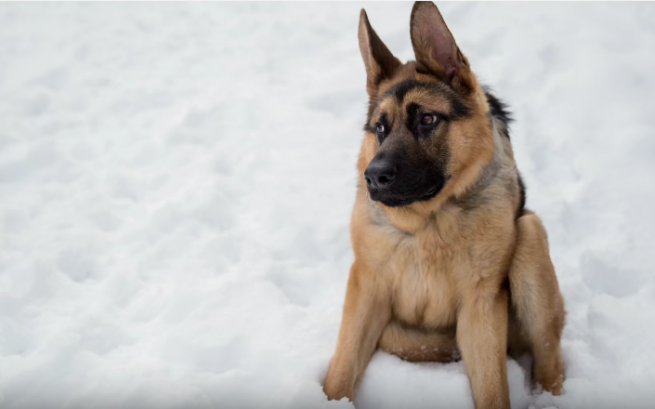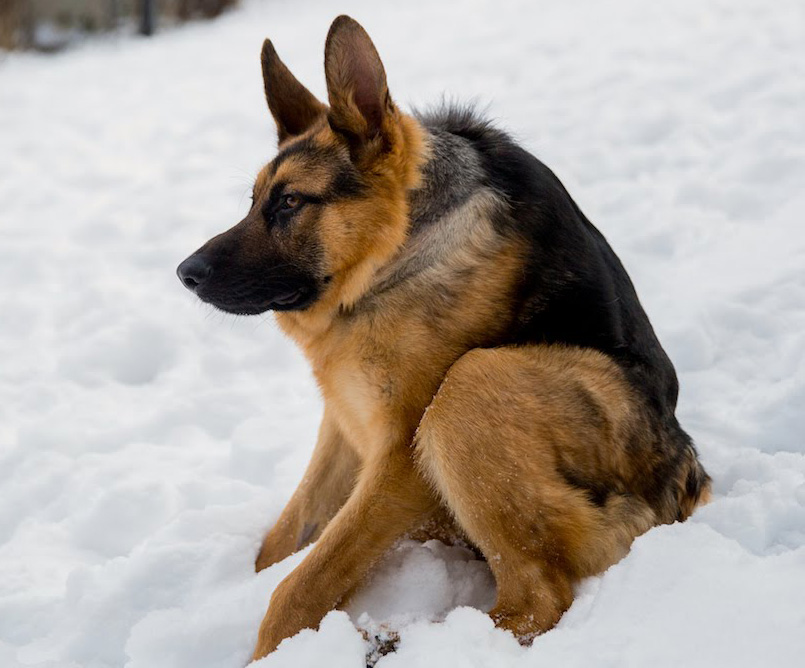Like humans, some animals can have spinal conditions. This problem can be related to a degradation in the spine, or the German Shepherd with No Neck can be born with this problem. The collarless German shepherd is known as a syndrome that only 30 dogs of this breed suffer from in the world.
Surely you could see on the internet the story of a dog known as the hunchback. This German shepherd has broken spine syndrome, a rare disease in this breed, but having it can cause many discomforts because the dog will not have a good quality of life.
The collarless German shepherd is called with this name because his spine does not have another dog’s normal length. Also, the dog’s trunk can look very short. This syndrome has many disadvantages since the German shepherd who suffers from it is more vulnerable to many more diseases that can seriously affect his health.
What Is A German Shepherd Short Spine Disorder?
Contents

According to experts, a German Shepherd with No Neck is known as a syndrome caused by inbreeding. The vertebrae in the spine remain under a cartilage-like condition and do not strengthen into the bone through this syndrome. That is why some of the vertebrae are fusing, and movement is becoming more restricted.
Most German Shepherd with No Neck has compression in the cervical spine. And it is for this reason that it appears that the dog does not have a neck. For this reason, in case the dog wants to look back, he must turn his body completely to see.
Likewise, when the spine is shortened, dogs with this condition will also have shorter bodies. However, this condition does not affect the extremities since its legs are related to its short body size.
By 2006 it was believed that there were only 14 dogs in the world with this condition. However, after knowing some dogs’ history with this syndrome, it was possible to know that 30 dogs with this same condition scattered in the world.
What Are Some Hunchback GSD Medical Problems I Can Expect?

The German Shepherd with No Neck can go through certain complications from this syndrome. Among these complications can be observed:
-
Lumbosacral syndrome
This syndrome is also known as the cauda equina syndrome, and it is more common to see it in the collarless German shepherd than in dogs without any syndrome. This type of syndrome affects the sacral nerves of your GDS, and as a consequence, you will suffer pain, muscle atrophy, and discomfort when standing or sitting.
They can also develop urinary and fecal incontinence. For these reasons, the neckless German shepherd needs plenty of rest and a prescription for anti-inflammatory and pain reliever medications to help cope with this medical problem.
-
Intervertebral disc disease
When the cushioning discs in the neckless German shepherd’s spine rupture, this very painful disease occurs. This disease has some additional symptoms where the dog can go through muscle spasms in the back and neck area.
Another symptom is weakness, and consequently, the German shepherd will feel very weak to play. For this type of disease, a non-invasive treatment consists of anti-inflammatory and analgesic drugs. Many people also limit the neckless German shepherd to sleeping in a cage for a few weeks.
When the spine is severely affected, surgery is likely to be necessary to remove part or all of the vertebra.
-
Single puppy syndrome
Because the collarless German shepherd has short spines, having a litter of two or more puppies will bring disadvantages to the German shepherd with this syndrome. Of course, a litter of one can also bring inconveniences such as stillbirths or premature births.
Death of the fetus while in the mother’s womb could also be a possibility. It is preferable to avoid pregnancy in a short-neck German shepherd because there could be serious health complications. Most likely, if your neckless German shepherd gets pregnant, the doctor will send out some medications and stop.
-
Screw tail
The neckless German shepherd is more likely to suffer from a screw tail. When this condition occurs, the tail folds inward because there is not a complete vertebra.
When this condition is severe and neglected, the dog can develop dermatitis, rectal canal obstruction, and skin infections. When the screw tail is mild, regular washing and disinfection should be carried out and antibiotics.
If the screw tail reaches a state of gravity, partial or complete docking of the neckless German shepherd’s tail should be carried out.
Each of these diseases will deteriorate the health of the German shepherd. That is why dogs with this syndrome require great care in terms of their quality of life and diet. They cannot be agitated as they need to rest so that their condition does not get worse.
What Other Accommodations Will My Short-Spined GSD Need?
The German Shepherd with No Neck requires a lot of care to avoid severe complications in them. That is why you must change your habits and everything necessary for your well-being:
-
Lunchtime
The neckless German shepherd’s food bowl should be higher than usual because its short spines will make it difficult for it to lower its head to the ground. Also, you should give him much less than the normal portions of food to avoid overweight in them.
-
The shorter walks and games
The neckless German shepherd tends to tire much faster than the normal German shepherd. That is why it is preferable not to leave them outdoors for a long time because they will need more time for their rest.
Experts recommend that the collarless German shepherd should do an hour to an hour and a half maximum of games and walks. Also, the collarless German shepherd should not take walks that exceed 4 km in the distance.
You should avoid exercise in the neckless German shepherd, as well as games that require a lot of jumping. When the dog with this syndrome is agitated, they can be more vulnerable to fatigue or other diseases due to their condition.
The German shepherd that suffers from this condition is very vulnerable and requires a lot of care. That is why it needs a lot of attention from its owners and needs constant measured attention to monitor its state of health.
Although there are few dogs in the world with this condition, it is a syndrome that any German Shepherd can have, and you must know how to cope with the situation.




